蓝桥杯算法集训 - Week 4:BFS、并查集、Flood Fill、哈希、单调栈、单调队列
蓝桥杯算法集训 - Week 4
本系列随笔用于整理AcWing题单——《蓝桥杯集训·每日一题2024》的系列题型及其对应的算法模板。
一、BFS
BFS算法复习参考:BFS (Java) 广度优先搜索 简单介绍、模板、案例(一)
Ⅰ、代码模板
static void bfs(T root) {
// 双端队列,用来存储元素
Deque<T> queue = new ArrayDeque<>();
// 添加首个元素
queue.add(root);
// 当队列不为空一直进行循环,直到队列不再有元素
while(!queue.isEmpty()){
int n = queue.size();
for(int i = 0; i < n; i++){
var t = queue.poll();
// 在同一层的操作
// ...
}
// 在非同层更新答案
}
}
Ⅱ、母亲的牛奶
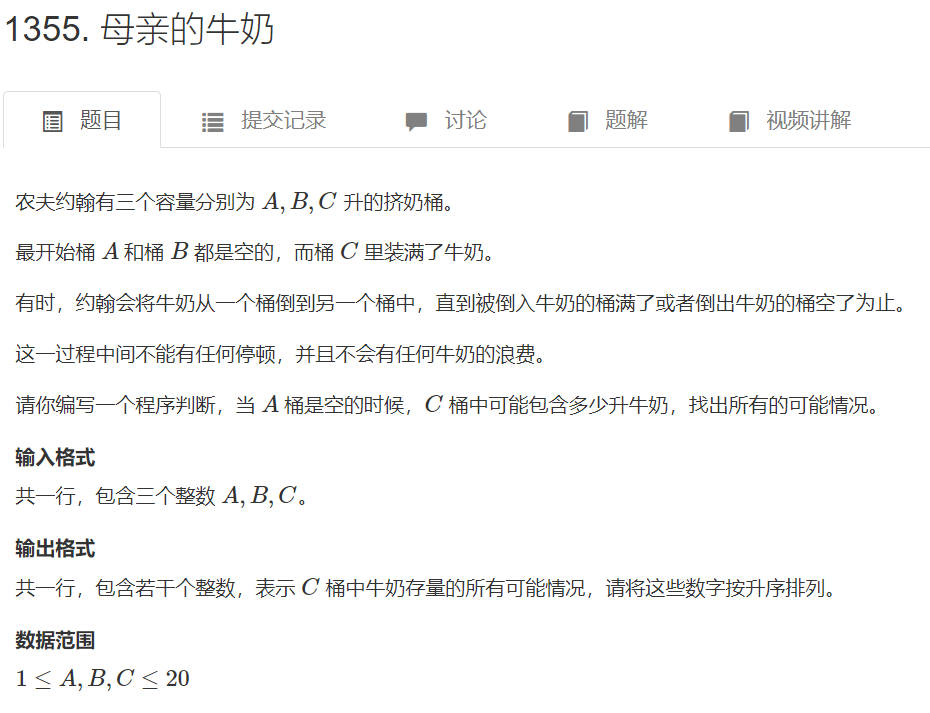
import java.util.*;
public class Main {
static final int N = 25;
static int abc[] = new int[3];
public static void main(String[] args) {
Scanner sc = new Scanner(System.in);
for (int i = 0; i < 3; i++) {
abc[i] = sc.nextInt();
}
sc.close();
boolean used[][][] = new boolean[N][N][N];
used[0][0][abc[2]] = true;
Queue<int[]> q = new LinkedList<>();
q.add(new int[] { 0, 0, abc[2] });
while (!q.isEmpty()) {
int[] a = q.poll();
// 从i往j里到牛奶
for (int i = 0; i < abc.length; i++) {
for (int j = 0; j < abc.length; j++) {
if (i != j) {
int[] t = a.clone();
if (t[i] + t[j] <= abc[j]) {
t[j] += t[i];
t[i] = 0;
} else {
t[i] -= abc[j] - t[j];
t[j] = abc[j];
}
if (!used[t[0]][t[1]][t[2]]) {
used[t[0]][t[1]][t[2]] = true;
q.add(t);
}
}
}
}
}
for (int i = 0; i <= 20; i++) {
boolean flag = false;
for (int j = 0; j <= 20; j++) {
if (used[0][j][i]) {
flag = true;
break;
}
}
if (flag)
System.out.print(i + " ");
}
}
}
二、并查集
并查集算法复习参考:【算法与数据结构】—— 并查集
Ⅰ、代码模板
// 存储每个点的祖宗节点
static int[] ps = new int[N];
// 返回 x 的祖宗节点
static int find(int x) {
if (ps[x] != x)
ps[x] = find(ps[x]);
return ps[x];
}
// 初始化,假定节点编号是 1~n
for (int i = 1; i <= n; i ++ ) {
ps[i] = i;
}
// 合并 a 和 b 所在的两个集合
ps[find(a)] = find(b);
Ⅱ、奶酪
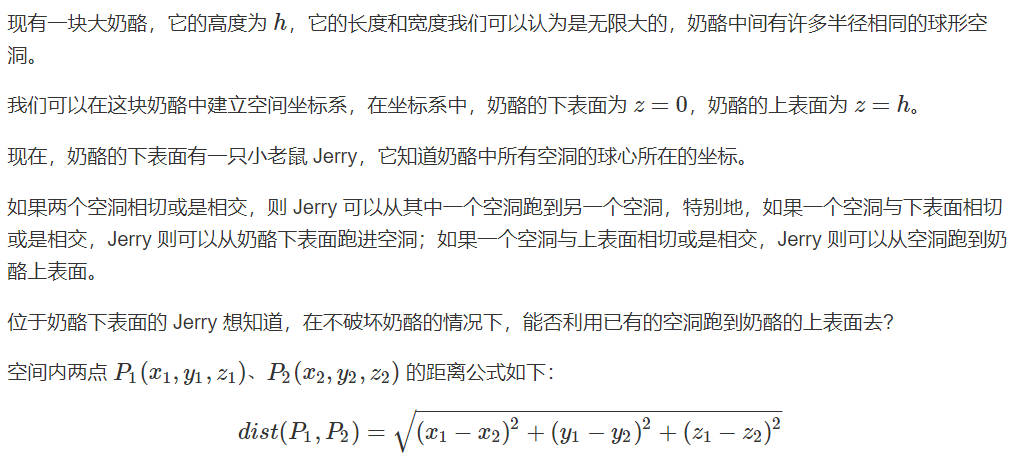
import java.util.*;
public class Main {
static final int N = 1010;
static int n, h, r;
static Point[] points = new Point[N];
static int[] ps = new int[N];
public static void main(String[] args) {
Scanner sc = new Scanner(System.in);
int T = sc.nextInt();
while (T-- > 0) {
n = sc.nextInt();
h = sc.nextInt();
r = sc.nextInt();
for (int i = 1; i <= n; i++)
points[i] = new Point(sc.nextInt(), sc.nextInt(), sc.nextInt());
// 初始化并查集
for (int i = 1; i <= n; i++)
ps[i] = i;
// 连通每一个可以连通的空洞
for (int i = 1; i <= n; i++)
for (int j = i + 1; j <= n; j++)
if (check(i, j))
ps[find(j)] = find(i);
// 存储上下面与哪些连通块连通
HashSet<Integer> down = new HashSet<>(), up = new HashSet<>();
for (int i = 1; i <= n; i++) {
if (check(i, 0))
down.add(find(i));
if (check(i, n + 1))
up.add(find(i));
}
// 校验上下底面是否可以属于同一个连通块
boolean success = false;
for (Integer x : down)
if (up.contains(x)) {
success = true;
System.out.println("Yes");
break;
}
if (!success)
System.out.println("No");
}
sc.close();
}
// 查找x的祖宗节点
public static int find(int x) {
if (ps[x] != x)
ps[x] = find(ps[x]);
return ps[x];
}
// 判断两个球体是否相交或相切
public static boolean check(int i, int j) {
Point p1 = points[i];
Point p2 = points[j];
// 球与下底面相交相切
if (j == 0)
return p1.z <= r;
// 球与上底面相交相切
else if (j == n + 1)
return p1.z + r >= h;
// 计算两球体的距离是否大于两倍半径
int x1 = p1.x, y1 = p1.y, z1 = p1.z;
int x2 = p2.x, y2 = p2.y, z2 = p2.z;
long dist = (long) (x1 - x2) * (x1 - x2) + (long) (y1 - y2) * (y1 - y2) + (long) (z1 - z2) * (z1 - z2);
return dist <= 4 * (long) r * r;
}
static class Point {
int x, y, z;
public Point(int x, int y, int z) {
this.x = x;
this.y = y;
this.z = z;
}
}
}
三、Flood Fill
Flood Fill 算法,即洪水填充算法或洪泛法,是用于解决连通块问题的经典算法模型;其通常可以使用 DFS 、BFS 、并查集的算法思路来实现。
复习参考:带你学习Flood Fill算法与最短路模型。
Ⅰ、实现方式
① 通过 DFS 算法递归搜索四周符合连通要求的点返回集合;
static final int N = 1010;
static char[][] matrix = new char[N][N];
static int[][] st = new int[N][N];
// 递归搜索所有与(a, b)连通的点
static void dfs(int a, int b, List<Pair> list) {
// 添加到当前连通块集合
list.add(new Pair(a,b));
// 标记为已访问
st[a][b] = 1;
// 遍历当前位置的八个方向
for (int x = a - 1; x < a + 1; x++) {
for (int y = b - 1; y < b + 1; y++) {
if (x >= 0 && y >= 0 && x < n && y < m && st[x][y] != 0 && matrix[x][y] == 'X') {
dfs(x, y, list);
}
}
}
}
② 通过 BFS 算法遍历矩阵数据查找连通块;
static final int N = 1010;
static char[][] matrix = new char[N][N];
static int[][] st = new int[N][N];
static Deque<Pair> q = new ArrayDeque<>();
// 找出点(a, b)所构成的连通块
static void bfs(int a, int b) {
// 首个元素入队
q.push(new Pair(a, b));
st[a][b] = 1;
while(!q.isEmpty()) {
Pair p = q.pollFirst();
// 扩展队头(遍历所有邻接点)
for (int x = p.x - 1; x < p.x + 1; x++) {
for (int y = p.y - 1; y < p.y + 1; y++) {
// 边界与连通条件判断
if (x >= 0 && y >= 0 && x < n && y < m && st[x][y] != 1 && matrix[x][y] == 'X') {
//邻接节点入队
q.push(new Pair(x, y));
st[x][y] = 1;
}
}
}
}
}
③ 通过并查集算法合并四周的连通部分——图中连通块的个数:并查集。
static final int N = 1010;
static char[][] matrix = new char[N][N];
static int[] ps = new int[N * N]; // 并查集辅助数组
// 将连通着的点通过并查集合并,求出连通块的个数
static int getNums() {
int row = matrix.length;
int col = matrix[0].length;
// 对并查集辅助数组 ps 进行初始化
for(int i = 0; i < row; i++)
for(int j = 0; j < col; j++) {
int num = col * i + j;
ps[num] = num;
}
// 遍历图中的每个点
for(int i = 0; i < row; i++)
for(int j = 0;j < col; j++) {
if(matrix[i][j] == 'X') {
int down = i + 1, right = j + 1;
if(down < row && grid[down][j] == 'X')
ps[find(col * i + j)] = find(col * down + j); // 合并两个元素所在的集合
if(right < col && grid[i][right] == 'X')
ps[find(col * i + j)] = find(col * i + right);
}
}
// 遍历并查集数组,统计连通块的个数
int res = 0;
for(int i = 0; i < row; i++)
for(int j = 0; j < col; j++) {
int num = col * i+j;
if(ps[num] == num && matrix[i][j]=='X')
res++;
}
return res;
}
// 并查集元素查找祖宗节点
static int find(int x) {
if(ps[x] != x)
ps[x] = find(ps[x]);
return ps[x];
}
Ⅱ、动态网格
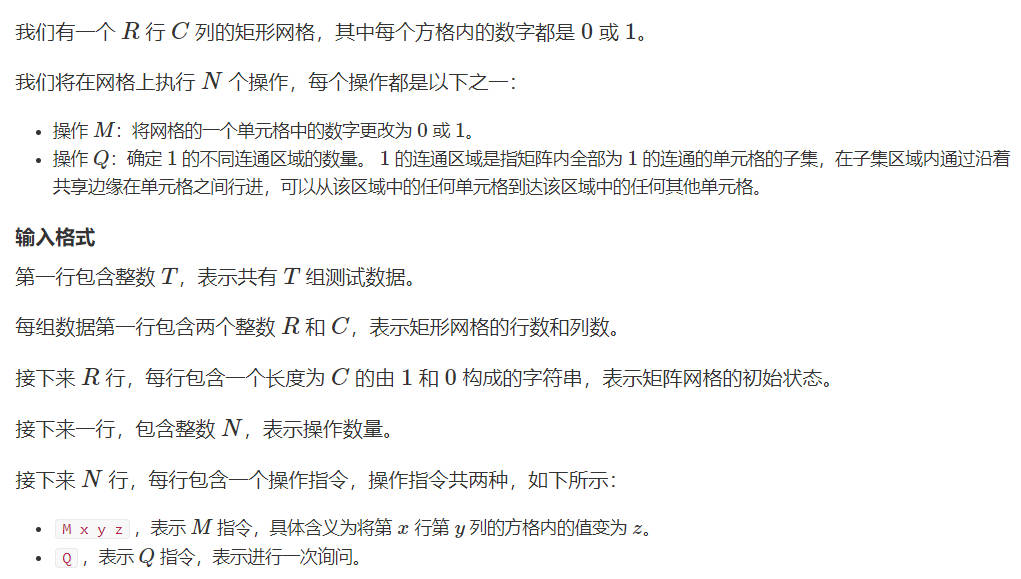
import java.util.Scanner;
public class Main {
static int T, R, C, N, res;
static int[][] matrix;
static int[] dx = {0, 1, 0, -1}, dy = {-1, 0, 1, 0};
public static void main(String[] args) {
Scanner sc = new Scanner(System.in);
T = sc.nextInt();
for (int cases = 1; cases <= T; cases++) {
R = sc.nextInt();
C = sc.nextInt();
matrix = new int[R][C];
for (int i = 0; i < R; i++) {
String next = sc.next();
for (int j = 0; j < C; j++) {
matrix[i][j] = next.charAt(j) - '0';
}
}
N = sc.nextInt();
sc.nextLine(); // 读取多余换行符
System.out.println(String.format("Case #%d:", cases));
for (int o = 0; o < N; o++) {
String[] split = sc.nextLine().split(" ");
if (split[0].equals("M")) { // 修改矩阵的值
matrix[Integer.parseInt(split[1])][Integer.parseInt(split[2])] = Integer.parseInt(split[3]);
} else { // 计算当前矩阵的连通块数量
res = 0;
int[][] clone = new int[R][C];
for (int i = 0; i < matrix.length; i++) {
clone[i] = matrix[i].clone();
}
for (int i = 0; i < R; i++) {
for (int j = 0; j < C; j++) {
if (clone[i][j] == 1) {
dfs(clone, i ,j);
res++;
}
}
}
System.out.println(res);
}
}
}
sc.close();
}
// DFS搜索所有连通块
static boolean dfs(int[][] m, int a, int b) {
int temp = m[a][b];
m[a][b] = -1;
if (temp == -1)
return false;
for (int i = 0; i < 4; i++) {
for (int j = 0; j < 4; j++) {
int x = a + dx[i], y = b + dy[i];
if (x >= 0 && x < R && y >= 0 && y < C && m[x][y] == 1) {
dfs(m, x, y);
}
}
}
return false;
}
}
四、哈希
Ⅰ、代码模板
开放寻址法
int[] h = new int[N];
// 如果x在哈希表中,返回x的下标;如果x不在哈希表中,返回x应该插入的位置
static int find(int x) {
int t = (x % N + N) % N;
while (h[t] != 0 && h[t] != x) {
t++;
if (t == N)
t = 0;
}
return t;
}
Ⅱ、星空之夜
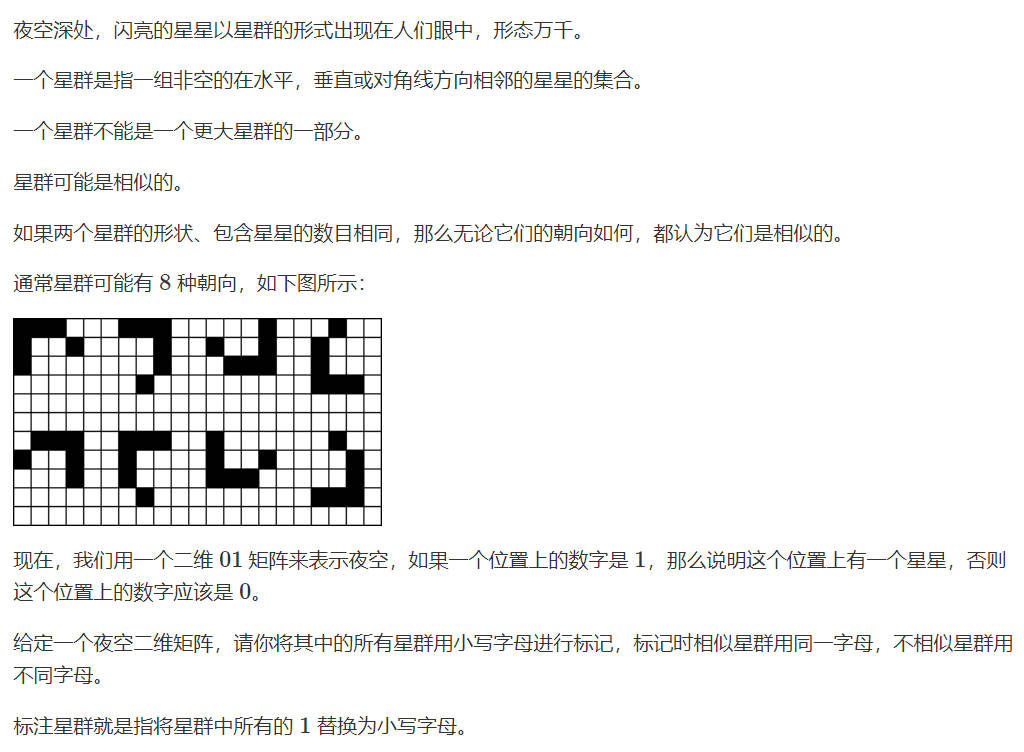
import java.io.*;
class Main {
static int n, m, top, idx = 0;
static int[][] pos;
static char[][] matrixs;
static double[] hash = new double[26];
static final double eps = 1e-8;
public static void main(String[] args) throws IOException {
BufferedReader br = new BufferedReader(new InputStreamReader(System.in));
PrintWriter pw = new PrintWriter(System.out);
n = Integer.parseInt(br.readLine());
m = Integer.parseInt(br.readLine());
pos = new int[n * m][2];
matrixs = new char[m][n];
for (int i = 0; i < m; i++)
matrixs[i] = br.readLine().toCharArray();
br.close();
for (int i = 0; i < m; i++)
for (int j = 0; j < n; j++)
if (matrixs[i][j] == '1') {
top = 0;
dfs(i, j);
char c = getId(getHash());
for (int k = 0; k < top; k++)
matrixs[pos[k][0]][pos[k][1]] = c;
}
for (int i = 0; i < m; i++) {
for (int j = 0; j < n; j++)
pw.print(matrixs[i][j]);
pw.println();
}
pw.close();
}
// DFS搜索每个独立星群
public static void dfs(int a, int b) {
matrixs[a][b] = '0';
pos[top++] = new int[] { a, b };
for (int x = a - 1; x <= a + 1; x++) {
for (int y = b - 1; y <= b + 1; y++) {
if (x >= 0 && x < m && y >= 0 && y < n && matrixs[x][y] == '1')
dfs(x, y);
}
}
}
// 获取对应星云的ID字母
public static char getId(double key) {
char c = 'a';
for (int i = 0; i < idx; i++) {
if (Math.abs(hash[i] - key) < eps) {
c += i;
return c;
}
}
c += idx;
hash[idx++] = key;
return c;
}
// 计算每种形状星群的Hash值
public static double getHash() {
double sum = 0;
for (int i = 0; i < top; i++)
for (int j = i + 1; j < top; j++)
sum += getDist(pos[i], pos[j]);
return sum;
}
// 两点的切比雪夫距离
public static double getDist(int[] a, int[] b) {
int x = a[0] - b[0];
int y = a[1] - b[1];
return Math.sqrt(x * x + y * y);
}
}
五、单调栈、单调队列
算法思想复习参考:单调队列和单调栈(通俗易懂)
Ⅰ、代码模板
单调栈 —— 常见模型:找出每个数左边离它最近的比它大(或小)的数
static int[] s = new int[N]; // 模拟栈
static int tt = 0; // 栈顶下标
for (int i = 1; i <= n; i++) {
while (tt != 0 && check(s[tt], i))
tt--;
s[++tt] = i;
}
单调队列 —— 常见模型:找出滑动窗口中的最大值(或最小值)
static int[] q = new int[N]; // 模拟队列
static int hh = 0, tt = -1; // 队首和队尾下标
for (int i = 0; i < n; i++) {
while (hh <= tt && checkOut(q[hh])) // 判断队头是否滑出窗口
hh++;
while (hh <= tt && check(q[tt], i))
tt--;
q[++tt] = i;
}
Ⅱ、矩形牛棚
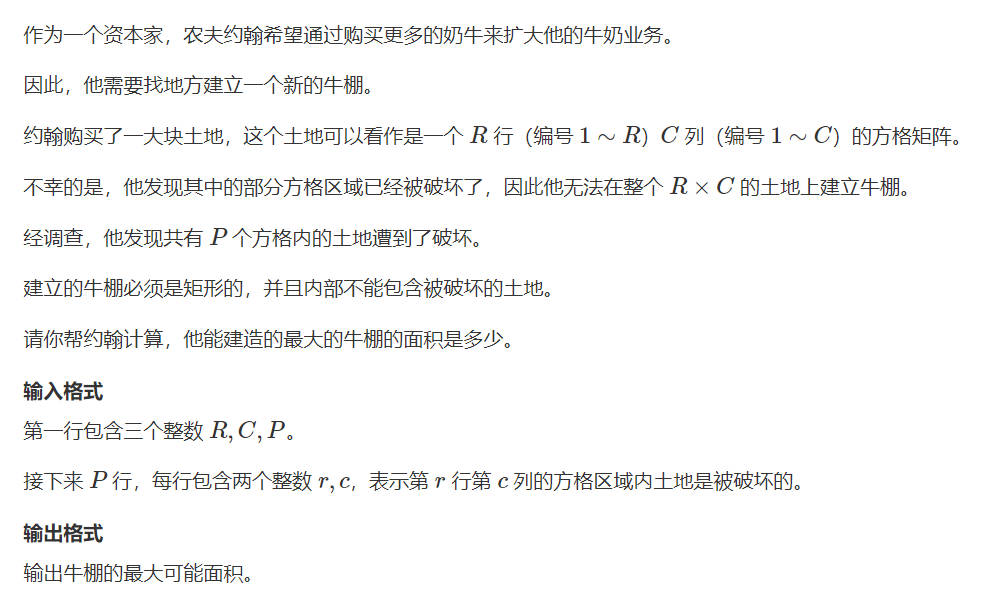
import java.io.*;
import java.util.*;
public class Main {
static final int N = 3010;
static int r, c, p, res = 0;
static int[][] broken = new int[N][N];
public static void main(String[] args) throws IOException {
BufferedReader br = new BufferedReader(new InputStreamReader(System.in));
String[] split = br.readLine().split(" ");
r = Integer.parseInt(split[0]);
c = Integer.parseInt(split[1]);
p = Integer.parseInt(split[2]);
for (int i = 0; i < p; i++) {
split = br.readLine().split(" ");
broken[Integer.parseInt(split[0])][Integer.parseInt(split[1])] = -1;
}
// 枚举下边界
for (int i = 1; i <= r; i++) {
// 递推计算下边界高度
for (int j = 1; j <= c; j++) {
if (broken[i][j] == -1)
broken[i][j] = 0;
else
broken[i][j] = 1 + broken[i - 1][j];
}
// 通过单调栈找出小于当前元素的最近元素
int[] left = new int[c + 5], right = new int[c + 5];
Arrays.fill(right, c + 1);
Deque<Integer> stack = new ArrayDeque<Integer>();
for (int j = c; j > 0; j--) {
while (!stack.isEmpty() && broken[i][j] < broken[i][stack.peek()])
left[stack.pop()] = j;
stack.push(j);
}
stack.clear();
for (int j = 1; j <= c; j++) {
while (!stack.isEmpty() && broken[i][j] < broken[i][stack.peek()])
right[stack.pop()] = j;
stack.push(j);
}
// 枚举计算最大矩阵面积
for (int j = 1; j <= c; j++) {
res = Math.max(res, broken[i][j] * (right[j] - left[j] - 1));
}
}
System.out.println(res);
}
}
本文来自博客园,作者:TfiyuenLau,转载请注明原文链接:https://www.cnblogs.com/tfiyuenlau/p/18095192

 蓝桥杯集训·每日一题2024 Week 4所涉及的算法题及其代码模板。本系列随笔用于整理AcWing题单——《蓝桥杯集训·每日一题2024》的系列题型及其对应的算法模板。
蓝桥杯集训·每日一题2024 Week 4所涉及的算法题及其代码模板。本系列随笔用于整理AcWing题单——《蓝桥杯集训·每日一题2024》的系列题型及其对应的算法模板。
